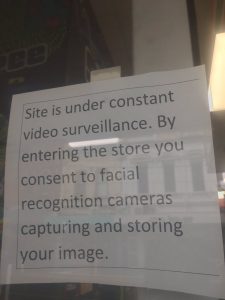
Facial recognition technology is increasingly being trialled and deployed around Australia.
The technology scans and stores facial features as unique data.
It can then be data-matched against photos — such as pictures stored in the Federal Government’s massive biometric database, which includes drivers licences, passports and harvested from social media accounts.
Queensland and Western Australia are reportedly already using real-time facial recognition through CCTV cameras.
Over the past decade, facial recognition technology has spread across a number of industries. In many stores in China, you can now pay with your face.
7-Eleven Australia is also deploying facial recognition technology in its 700 stores nationwide for what it says is customer feedback.
To discuss this I spoke with Rick Sarre Adjunct Professor of Law and Criminal Justice at the University of South Australia.
[Note: Apologies for the intro – I have a cold!]
